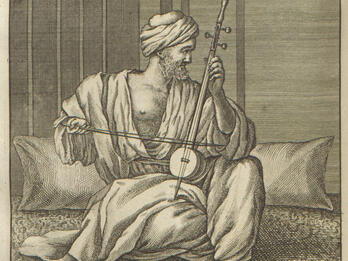Menot ha-levi (Portions of the Levite)
And I have heard an amazing reason from an old man as to why music was absent from that feast [of King Ahasuerus], and I present it here, with a great number of additions to what I heard. These will help us understand the absence of any players of beautiful music; the father of all those who handle the harp and the pipe (Genesis 4:21). Those sounds are mainly pleasing to those who hear them, and, as we have already stated, it was the fundamental objective of this feast that the Jewish nation should become defiled with the king’s food and with the wine that he drank. Why are melody and instrumental music pleasing to the soul? It is because the soul is attuned to hearing this sound while still in heaven, as is well known to anyone who does not deny the plain meaning of biblical verses and their truth; as the angels on high open their mouths, “blessing, praising, and glorifying,” etc. the Almighty, with “purity of speech,” etc.—and, as the prophet describes I heard the sound of their wings, etc. (Ezekiel 1:24).1 Now there are men to whom music is so delightful that they lose their senses until they do not know where they are, and some among them are overtaken by sleep, for the soul secludes itself to listen to the joyful sounds to the point at which it leaves the body like a dead carcass. For it tends to the body and when it becomes detached from overseeing it, it is as though the body has never existed, and it sleeps and enters into a trance. This is like young children, sucking at their mothers’ breast, who will not fall asleep before hearing the sound of joyful song, and once they have heard it, they rest on their beds and their sleep is pleasant, as the chimes and the pleasantness of the melody remain imbued in their souls during the small amount of time in which they have become detached from it. And the same applies to invalids, for when man’s physical powers wane, his spiritual forces assert themselves over against them; and a fortiori, a man in good health will sit without eating and drinking when listening to the sound of music. Accordingly, this pleasure was absent from that feast, notwithstanding it was a great occasion, so that there should be no one who refrained from eating and convinced himself that such abstinence was permissible by saying: The king has declared that [his officials] should do in accordance with every man’s desire (see Esther 1:8) and for whom it was pleasing to have abstained from eating—since, were this to occur, the enemy’s evil design would become null and void. So note this carefully!
Notes
[From the weekly morning Shema‘ service.—Trans.]
Credits
Published in: The Posen Library of Jewish Culture and Civilization, vol. 5.




